- News
- Reviews
- Bikes
- Accessories
- Accessories - misc
- Computer mounts
- Bags
- Bar ends
- Bike bags & cases
- Bottle cages
- Bottles
- Cameras
- Car racks
- Child seats
- Computers
- Glasses
- GPS units
- Helmets
- Lights - front
- Lights - rear
- Lights - sets
- Locks
- Mirrors
- Mudguards
- Racks
- Pumps & CO2 inflators
- Puncture kits
- Reflectives
- Smart watches
- Stands and racks
- Trailers
- Clothing
- Components
- Bar tape & grips
- Bottom brackets
- Brake & gear cables
- Brake & STI levers
- Brake pads & spares
- Brakes
- Cassettes & freewheels
- Chains
- Chainsets & chainrings
- Derailleurs - front
- Derailleurs - rear
- Forks
- Gear levers & shifters
- Groupsets
- Handlebars & extensions
- Headsets
- Hubs
- Inner tubes
- Pedals
- Quick releases & skewers
- Saddles
- Seatposts
- Stems
- Wheels
- Tyres
- Health, fitness and nutrition
- Tools and workshop
- Miscellaneous
- Tubeless valves
- Buyers Guides
- Features
- Forum
- Recommends
- Podcast
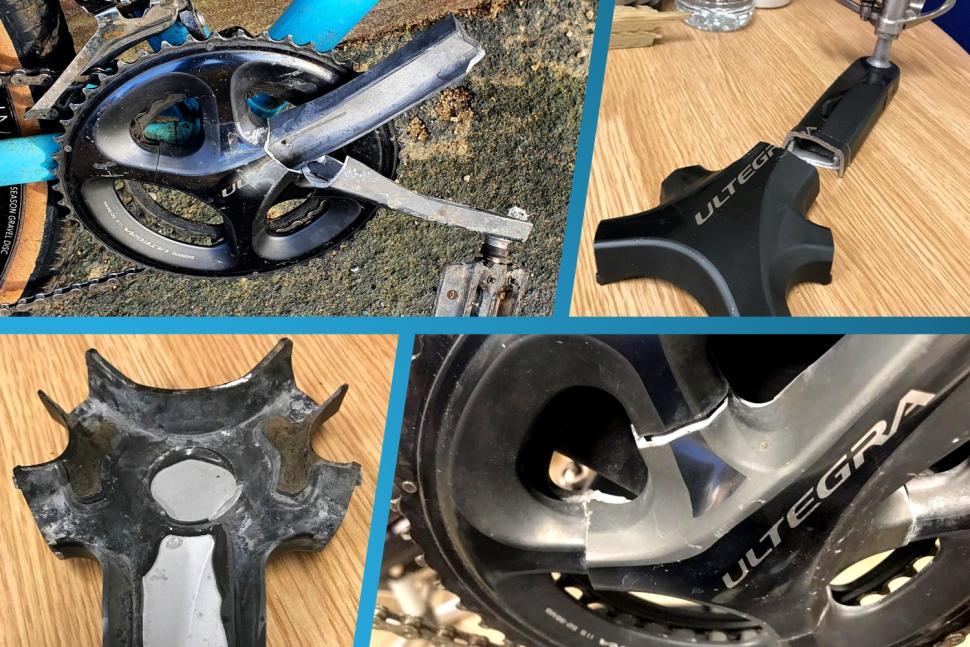 Investigating Shimano’s snapping cranksets Sept 2023
Investigating Shimano’s snapping cranksets Sept 2023"Banned" bike shop claims Shimano won't let it inspect Hollowtech cranksets as part of "inspection and replacement" programme due to failing 100% of them
One year on from Shimano announcing a voluntary inspection and replacement recall of Hollowtech cranks, a UK-based bike shop has claimed it has been "banned" from the inspection programme after the components giant's main UK distributor took issue with its policy of sending all cranks back to the manufacturer due to safety concerns.
Few were surprised when Shimano finally acknowledged the issue last September, cyclists having reported cracks and delamination on 11-speed road cranksets for years. However, in Europe and the UK, to the frustration of many, including one lawyer from Leigh Day that we spoke to, Shimano opted for issuing an "inspection and replacement program" rather than a full product recall.
This meant bike shops were tasked with inspecting customers' cranks, documenting any issues and, if found, sending concerning cranksets back to Shimano for replacement. There have been numerous issues with this process cited in the past 12 months, from legal fears over liability in case of incidents, through to questioning whether Shimano should instead be recalling all relevant cranksets regardless of present damage.
Now, however, another talking point has been raised as Mapdec Cycle Works, a Lake District-based bike shop that also uploads to its YouTube channel, has claimed it was "banned" from the inspection programme after revealing it is sending all cranks back to Shimano.
The shop's owner and founder Paul Vousden posted a video last week in which he suggested that for all Shimano cranks included in the recall which are brought in by customers, "We don't bother inspecting them, we just ship them back, it seems to be the industry norm on all the bike and mechanic forums that we follow, they all just say just ship them back, get a new set."
This seemingly did not go down well, Shimano's UK distributor Madison contacting the bike shop to say they are now on a 'banned list' and will not be paid the £35 that shops are given for each crank inspection.
"Shimano took a little bit of offence to that," Vousden said in a subsequent video uploaded to YouTube. "We got a phone call from Madison who had apparently spoken to Shimano and they asked us to take the video down, which we haven't done, and they said that we are adding you to the banned list, which means that we can no longer administer their crank inspection and replacement programme."
The Mapdec owner also clarified that, despite his comments in the previous video, the shop was inspecting cranks as per Shimano's requirements, and confirmed his business will still be supplied with Shimano stock, the 'ban' relating to them not being able to receive the £35 reimbursement for crank inspections that the components giant is offering to bike shops.
"The interesting thing for me was there is a list of banned shops, I didn't realise that," Vousden said. "The guy was like 'we are adding you to the list of banned shops'... how many people are on this list? The reason I'm concerned about that is that they are judging shops on their pass and fail rate. Because we had a one hundred per cent fail rate we've been banned."
Vousden told us he had not been given the names of any other 'banned' bike shops, while Shimano and Madison also opted against commenting when approached ahead of this story's publication.
Mapdec's owner continued: "We do inspect them, even though I said we don't inspect them. We do, we have to because in order to send them away to Shimano we have to take them apart, we have to clean them, we have to fill in this form, and on this form we have to take pictures at the back, the side, the front etc and show that we have actually cleaned it and done the inspection.
"But, it asks us, inspection passed or failed? There's no in between. It's a pass or a fail, so our policy has always been if it's clearly failed, it's obvious, it's a fail. But we would never write the word 'pass', we would always write something like 'customer reports creaking, customer not happy with the pass, unsure, please check'. So we thought that we'd send them off to Shimano and Shimano would then offer a second opinion.
"They didn't do that apparently, according to the guy at Shimano. We were just shipping them, we naturally thought that surely if we put some comment they have got to do some extra checks that we're not capable of doing or they have some more insights and processes, but the process clearly has been they've just been sending them [replacements] out.
"Shimano never ever sent one of these [inspected customers' cranks] back to us [...] it never happened, they always sent out a replacement, so that's what we did, that was our policy. I've always always put our customers first and I've never thought I'm going to be on the side of Shimano here."
As per the 36-page dealer's manual for the crankset inspection method, mechanics are required to undertake a process of inspecting and cleaning. The recall of last September is for 11-speed Hollowtech II road cranksets that were produced between 1 June 2012 and 30 June 2019, and covers the model numbers: Ultegra FC-6800 and FC-R8000, and Dura-Ace FC-9000, FC-R9100, and FC-R9100-P.
Once a relevant crankset has been identified, bike shops are asked to complete an inspection with the crank arm installed, looking for "cracks or gaps" in the indicated area or listening out for "abnormal noise".
With the crankset and chainrings now removed from the bike, mechanics are asked to clean it by following multiple pages of instructions included in the manual.
Then, an inspection of the removed crankset is required, again, bike shops told to look for "issues such as cracks or gaps in the crank arm" and areas indicated in the manual. If found, "immediately stop use and replace the target product", it concludes, suggesting that if no issues are found the chainrings and crankset can be reinstalled and continue to be used.
One concern that has been raised by the inspection process is the fear of riders whose cranks may appear fine at the time of inspection, but eventually fail. This is a topic that has been widely discussed online, one forum post on the topic asking: "As a local bike shop, is there any benefit in 'passing' a Shimano crank that's being inspected under recall?
"We're not material experts and even if we're sure it's okay it could fail in a short space of time. I doubt there would be any liability on the shop, but there could still be reputational impacts with some customers (you said it was fine but it still broke). Surely it's better just to send it back, the customer gets a new part with fitting and the shop doesn't have any negatives? Worst case Shimano examine it and send it back, in that case you have followed their guidance and if it fails then the emphasis is all on Shimano and their checker."
Likewise, in Mapdec's video, the second speaker explains that exact scenario happened to him, his crankset passed at the beginning of the recall only to fail during an effort not long after.
"We see comments now on our videos on this point, basically saying: 'Okay, you've checked it, what's to say it's not going to fail tomorrow or next week? What gives me the confidence to keep riding knowing that this will hold up and not fail on?'," they asked.
Madison did not comment on why Mapdec will no longer be paid for inspections, but the bike shop's video suggests it believes it was its 100 per cent fail rate that caused it.
A quick look on online forums suggests the fail rate experienced in inspections at other bike shops varies, especially between climates. Hotter, drier locations seemingly fail fewer cranks than wetter locations like the UK.
Echoing Mapdec's stance, one comment on a relevant thread says: "My shop wants no liability for this, so customers can send it in when they want, but we are warning all of them that unless Shimano says they are safe, they are unsafe. We've sent 12 cranks in, saying all have failed. All 12 have been replaced."
Incidentally, Mapdec says it will continue to inspect and document crank inspections if requested by customers, doing the work and completing the form, but will ask riders to take it to another shop to send back to Shimano.
"Our policy was always we don't want to be the one that says this is a pass, we always thought that, even though Shimano gave a liability release, that liability release in our mind wasn't strong enough," Vousden said. "Also we had customers coming up to us and saying: 'Well how do I know it's safe?' They'd come back the week later and say: 'Can you inspect it again it's still creaking? I'm not convinced this is not going to fail... I want a new one, I'm just going to keep coming back every week until you fail it'.
"The way I've played through it in my mind is let's say you weren't a director of the business and you had a nasty accident and broke your pelvis or something like that and you couldn't work, you would call a solicitor and try to seek compensation. I think that solicitor would very quickly identify there are two places to source compensation, from Mapdec — we inspected it, we said it was safe and we would be the last person to have touched — and Shimano.
"That claim would come into me, I would say: 'Hey, I've got a liability release from Shimano, this is part of a crank recall'. But even if that played out, it is still a load of time and effort and stress and I've got better things to do than fight out a case... we're busy enough as it is, I don't need to be in communication with insurance companies and solicitors and doing this, even if it turned out I could just shift everything to Shimano.
"I'm really proud of our stance, I will always put my customers first and I always think so long as I have customers I'll have suppliers. We've not been banned from supplying Shimano, they were absolutely clear on that. We can still do inspections, we are just not going to be paid for it."
On the legal concerns, last year we spoke to Leigh Day partner Thomas Jervis in an episode of the road.cc podcast, the solicitor telling us the whole recall is "a mess".
"I personally don't understand why it's still acceptable in the eyes of Shimano for consumers to be using this component as part of their bike until it basically fails," he said. "It's lose-lose for cyclists. Shimano can't have it both ways.
"The number one priority for Shimano should be that no more riders are harmed. I think the focus should be on preventing these accidents happening before they do, I see too many of them in my job."
Do you work at a bike shop inspecting Shimano cranks as part of the recall? We'd love to hear your thoughts in the comments, or email us at info [at] road.cc
Dan is the road.cc news editor and joined in 2020 having previously written about nearly every other sport under the sun for the Express, and the weird and wonderful world of non-league football for The Non-League Paper. Dan has been at road.cc for four years and mainly writes news and tech articles as well as the occasional feature. He has hopefully kept you entertained on the live blog too.
Never fast enough to take things on the bike too seriously, when he's not working you'll find him exploring the south of England by two wheels at a leisurely weekend pace, or enjoying his favourite Scottish roads when visiting family. Sometimes he'll even load up the bags and ride up the whole way, he's a bit strange like that.
Latest Comments
- stonojnr 12 min 46 sec ago
Videos like that from Jezza trivialise the real dangers cyclists face on the roads every day imo...
- brooksby 1 hour 33 min ago
Well yes, but it is the holidays
- Bigtwin 2 hours 3 min ago
I have the gross misfortune to live on her "patch". The state of roads policing (and the actual roads) and consequent danger everytime one gets on...
- Rendel Harris 2 hours 44 min ago
Thank you for that excellent forensic analysis, I couldn't figure out where I'd gone wrong! Must drink more coffee and put on glasses before trying...
- Cugel 3 hours 52 min ago
Strangely, I've ridden all of those roads/routes you describe (and a lot more in Noerthern England) entirely without a gizmo of any kind, other...
- ktache 4 hours 24 min ago
Effective little things. Even have them on my Good Bike, my least reflectored. Still working through packs of them I got very cheap at Tesco.
- SimoninSpalding 7 hours 10 min ago
You could say the same for foam rollers and lots of other "massage " balls etc. In my experience you know when you get it in the right spot, and as...
- David9694 18 hours 57 min ago
One Stop in Evesham ram raided on Christmas Day by thieves https://www.worcesternews.co.uk/news/24821392.one-stop-evesham-ram-raide...
- Spangly Shiny 22 hours 13 min ago
Bullseye!
- chrisonabike 23 hours 5 min ago
Shurely "we have to build more housing! But developers won't build 'affordable housing'. And where can we find land anyway (lots of nimbys)?"...
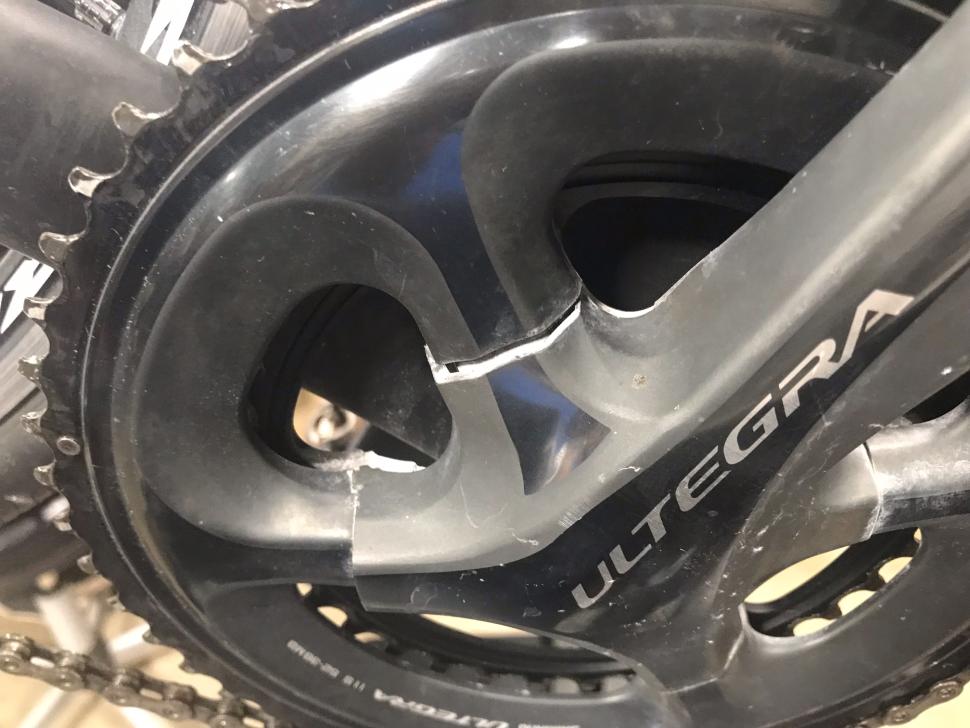
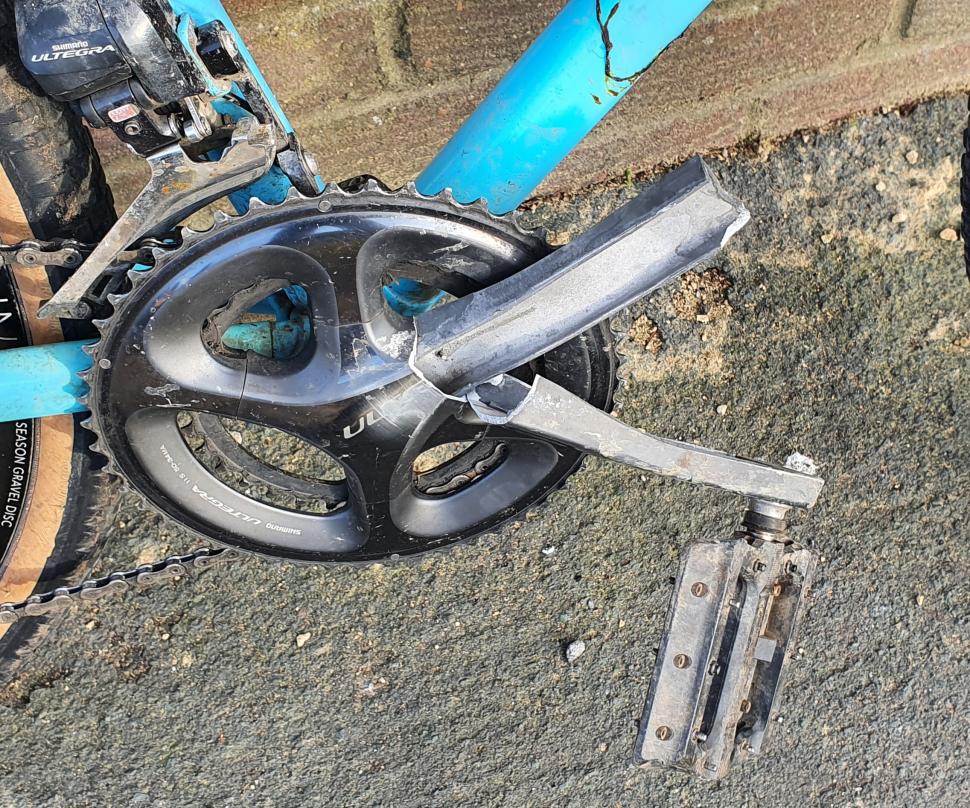
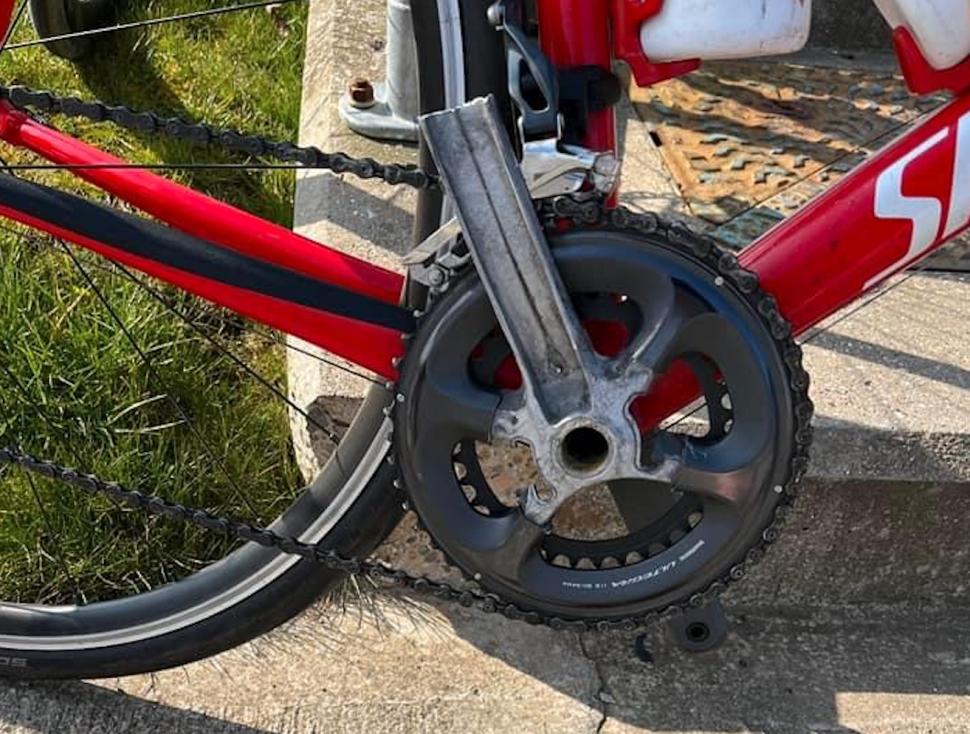
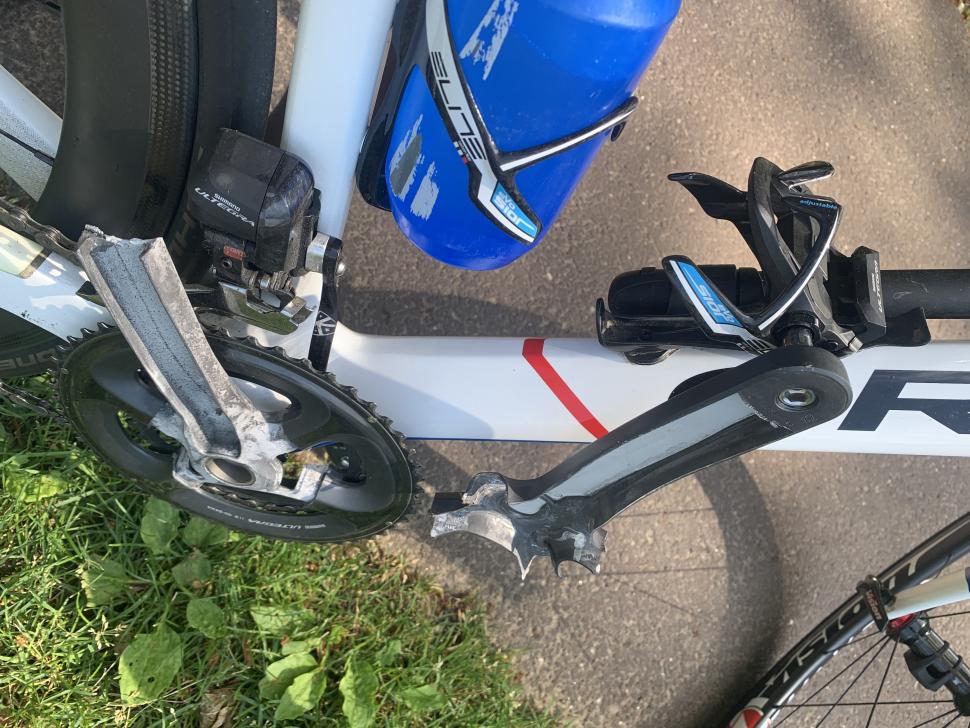
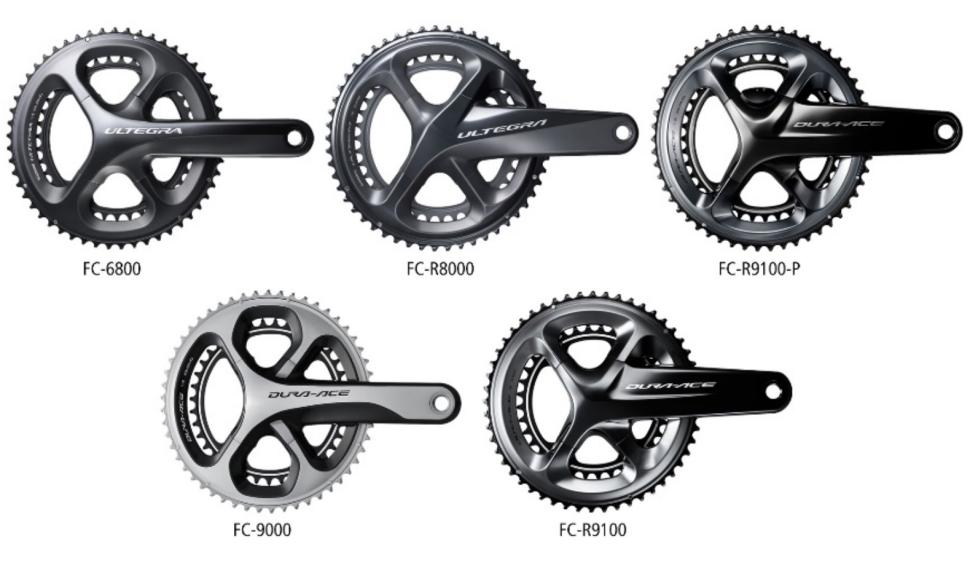
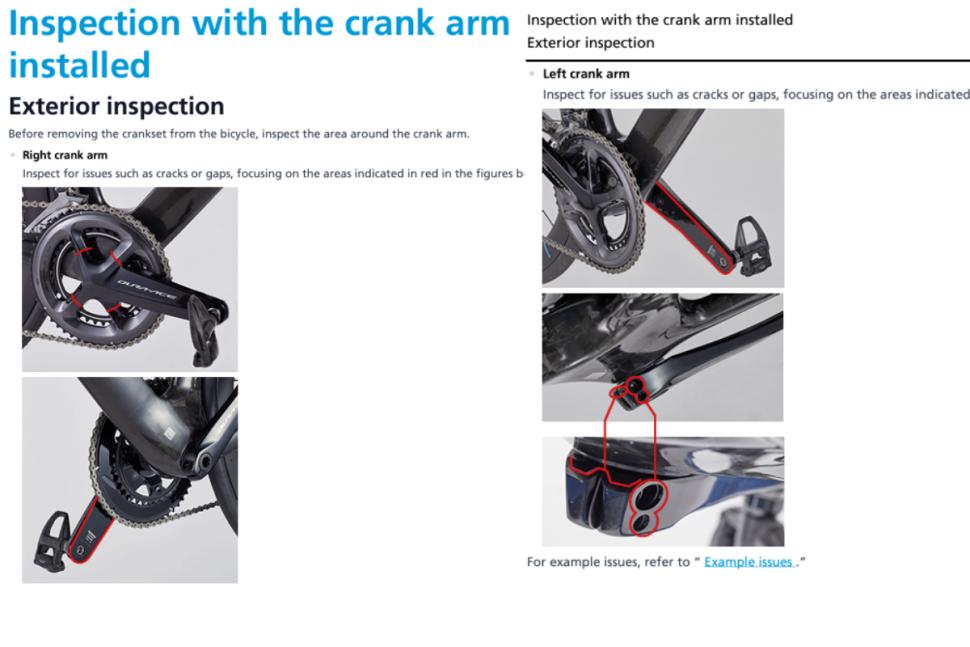
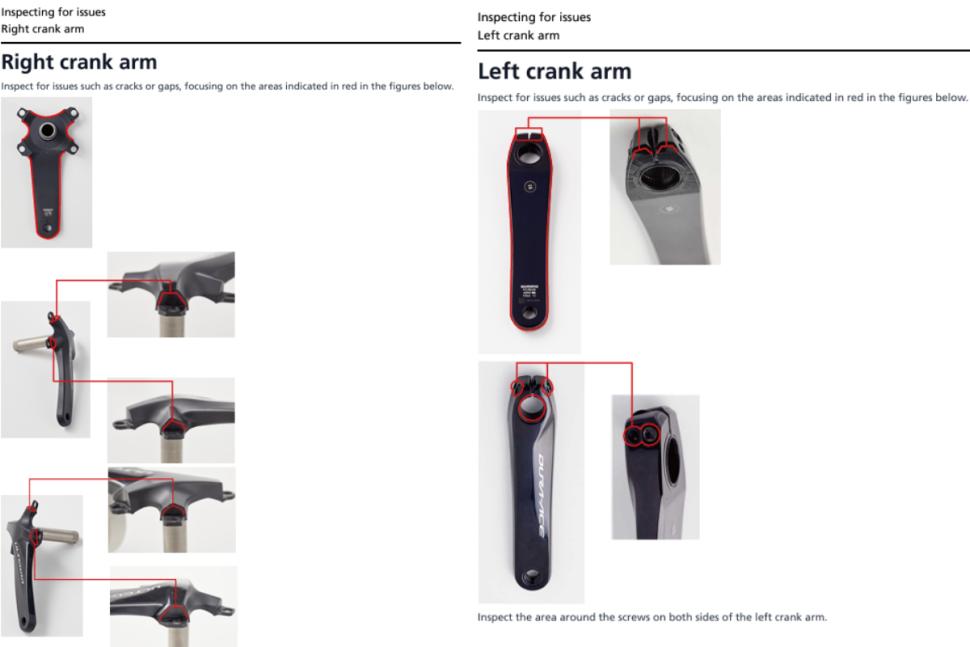
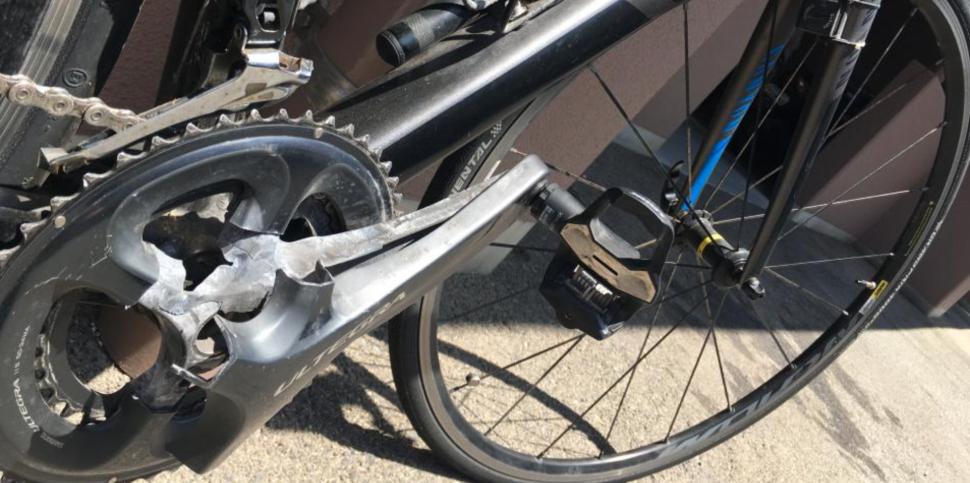
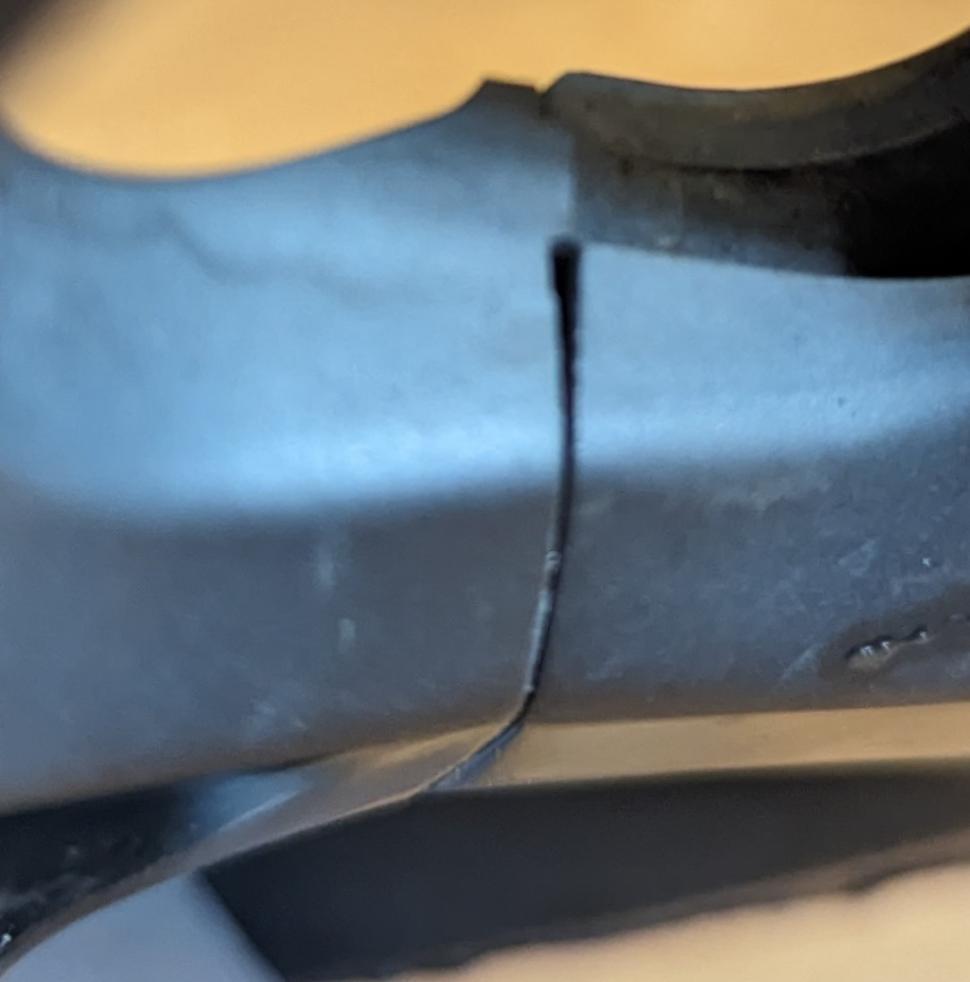
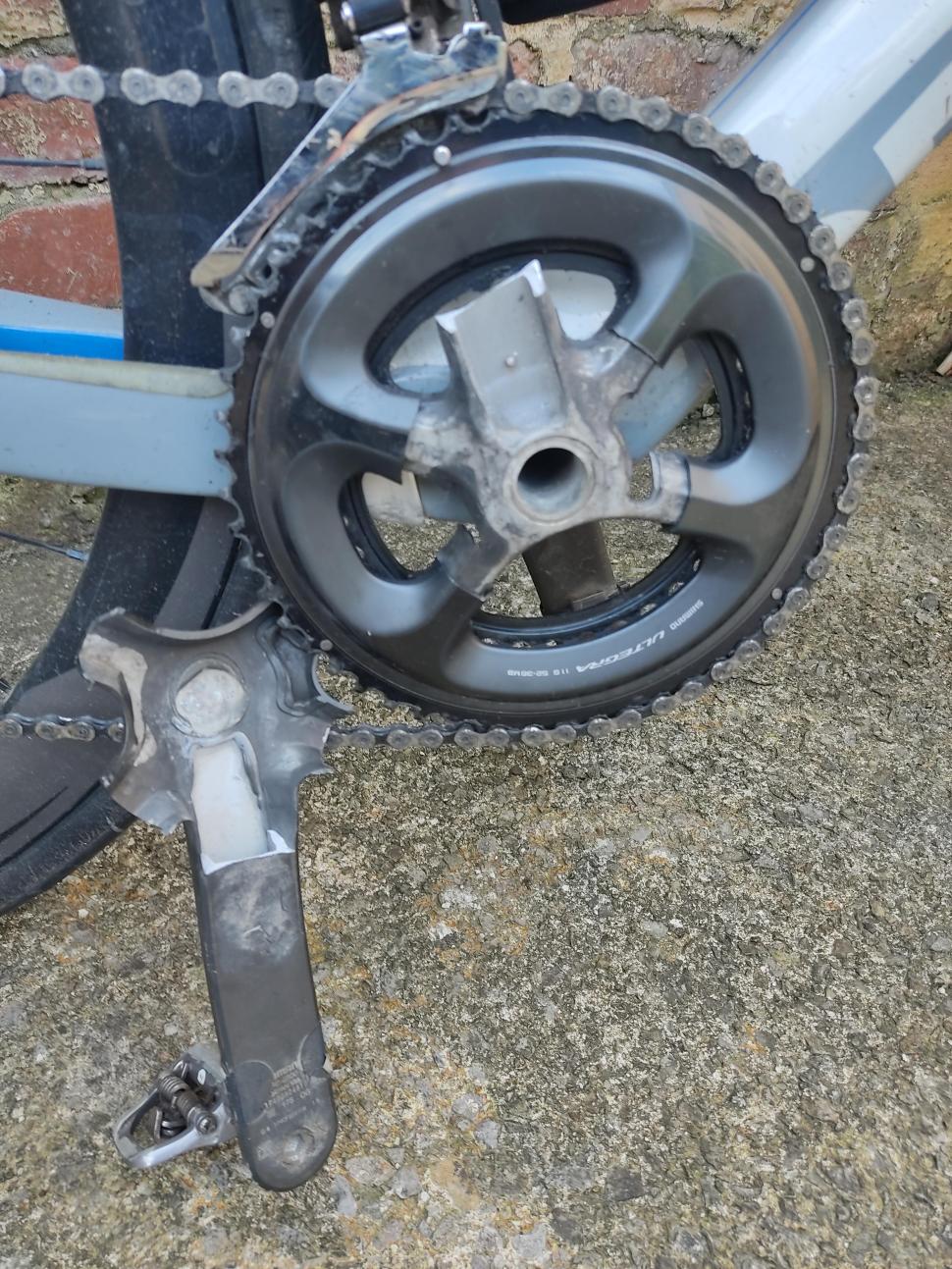
Add new comment
91 comments
"mechanics are required to undertake a process of inspecting and cleaning. The recall of last September is for 11-speed Hollowtech II road cranksets that were produced between 1 June 2012 and 30 June 2019, and covers the model numbers: Ultegra FC-6800 and FC-R8000, and Dura-Ace FC-9000, FC-R9100, and FC-R9100-P."
That should be the end of the process for the bike shop, the next line should be ""Once a relevant crankset has been identified, bike shops are asked to return the chainset to Shimano""
I wonder how the £35 inspection fee compares with the cost to Shimano of a new set of cranks, I doubt that there is much in it. When you add in the almost certainty that some (possibly many) cranks that were inspected and passed as ok to ride will fail in the future so they could be storing up some massive injury compensation costs and further reputational damage it seems short sighted not to do a complete recall and replacement.
Perhaps avoid playing for social media clout with tough lad statements like "We don't bother inspecting them, we just ship them back" when you later have to claim you actually do
There is an element of truth and mislead, but most likely a slip of the tongue. All cranks received by Shimano or their distributors have to be accompanied by a completed inspection form or claims will be rejected.
It is most likely that cranks that are not obvious fails are not inspected but the form filled in with a complaint from the customer about creaking noises.
The reality is, however, that these cranks should have been fully recalled as was the case in America. Shimano should have replaced the lot no questions asked, but they didn't. Instead the inspection policy was ambiguous and unfit for purpose, putting all bike shops in an awkward predicament. Considering there is a recall ban list, it suggests more bike shops ran a similar policy to Mapdec, it's just that they're the only ones to have gone public about it.
I am not attempting to absolve Shimano of negligence, and I do not need to have their failure explained to me
This is just a small glimpse in to a wider society problem - we, as a society, seem to be at odds with whistleblowing and scandal exposure. We offer little to no support or protection for those who make negligence and malpractice within organisations public knowledge. And often the lack of pressure resulting from said whistleblowing often leads to little change - allowing such practices to continue. And many of us now seem to lack the critical thinking that searches for a genuine solution to a real problem, instead of smoke and mirrors for a false problem.
Mapdec are only one of several bike shops that adopted the same policy because they were not confident in Shimano's inspection process, and were not willing to take any risks by following it blindly, and to their own detriment.
What whistle has been blown? Shimano crank failures are well documented. This story isn't about failed bonding and 10 years of ignoring the issue.
This story is about a Youtube personality making willy waving public statements for internet clout, getting found out and milking the controversy for even more content.
The only whistle being blown here is what constitutes bike shop industry "standard practice" according to Mapdec
Ah, bless…
I watched the vid when Mapdec released it, and i completely agree with their approach. They are not materials engineers, they dont have the ultrasound and x-ray equipment to establish this sort of issue (like the airline industry uses). A visual inspection and listening for "creaks" cannot be sufficient.
If I had one of the cranks listed, i would expect a full replacement. Anything else i would consider a fob off, and be very disillusioned.
Shimano pays the bike-stores to do a thorough visual inspection of the bonds (parts glued together). If Mapdec cannot and does not do this inspection (as they have admitted), then they should not take part in the inspection program. It's logical to throw them out.
I would certainly avoid this bike-store - it seems they're lying to suppliers and customers alike.
One thing not mentioned in this article (but was discussed in the Mapdec video) is the potential legal issue should a passed crankset subsequently fail - see an above post - the shop could still be held liable in court despite Shimano issuing a liability waiver.
If you have no legal protection for a very likely worst-case scenario, wouldn't you refuse to put yourself in that situation?
They were still filling out the forms. The shop wasn't charging customers for inspection of these cranks so it makes no difference to the consumer other than the peace of mind the equipment they are using is safe. the £35 payment from Shimano/Madison covers the hour's labour used up by performing this service and nothing more (being based on industry averages)
The affected products should have been fully recalled and replaced. Therefore this whole mess should not be the situation Mapdec, or any of the other unknown shops on the banned list find themselves in, in the first place.
Are you personally affiliated with Mapdec?
No. But they aren't the only shop in the same boat - one bike shop local to me I know of is also on this list (and they DON'T have a YT channel and a social media presence), and I have some experience and anecdotes of legal liability for professionals in the gas industry. That waiver is unlikely to hold up in a court of law, especially if the claim against the shop describes their actions as "negligence", unless the shop can prove otherwise (and the inspection sheets alone may not be enough to substantiate a dismissal of a claim).
If anyone actually applied a little critical thinking, and not the crackpot conspiracy kind, it would be obvious that Shimano's decision making has been poor, and it is that decision making that has lead to such a ridiculous situation.
Mapdec are only blacklisted because they made a video claiming they don't bother fulfilling their contract with Shimano, so how did your non-YT local shop end up in the same boat?
If tge shop has tge paperwork and pictures then the liability moves to shimano .There has to be proof of negligence, follow shimanos protocol and there is none
Not so clear. The shop said it was safe at it wasn't, and would need to prove both that they followed the protocol correctly and that the protocol was safe. Both can't be true (as it wouldn't have failed).
Shimano cannot act in the name of the victim, what it can do is pay lawyers and compensation if needed.
The clear and important issue is that, a crank may pass one inspection, but that does not guarantee that crank is defect free, it can still fail sometime in the future. As the video pinted out, the shareholder had this very experience.
Mapdec are putting the customer first. All cranks should be shipped back to Shimano for them to inspect, and issue a warranty they are safe to use.
You don't think he might use his friend to help h8s narrative ?
Please, Mapdec are putting their own business first.
Shimano are a disgrace . My bike had one of those cranks and it was making a strange noise for a few days and when I was out riding it just broke off and it was amazing that I didn't have a really bad accident . I was so lucky . They are so dangerous and there is no way of telling if they are going to break in the future or not . They need to all be replaced to save people from serious injury it's the only thing and the right thing to do . Why should people risk serious injury when they have paid for a part that is supposed to be top quality . It's an absolute joke . Shimano should be ashamed of theirselves . Peoples safety is priority end of .
Sammy Connor
Just realised that I've posted pretty much what you've already written.
The only positive to take from these shenanigans is that it seems like the cranks start to make noise before they fail catastrophically.
The guy in the MapDec video who had his crank fail - the director - said his failed unexpectedly and fairly suddenly. He says he was lucky he didn't come off when it went.
Well, that does seem like a strong argument for Shimano replacing all the affected batches of cranks.
I was lucky with my one as although I hadn't really associated the noise with the crank (I thought it was to do with chain/cassette issues), when it did snap, I was just outside my front door and merely got a slightly grazed knee.
It's his friend making sure his agenda is strengthened .They click before failure
Engineered objects, in particular light weight ones, are bound to fail one day. With reliable manufacturing, good design (sometimes fail safe) and reasonable inspection schedules, the likelyhood and the problems resulting from a failure are made acceptable, the object is no longer used before the failure occurs.
Just arguing that an object can still fail sometime in the future is not really helpful, as any object will do so over a very long time period.
Even so, the failure rate of the affected cranks are higher than is expected and in comparison to industry averages, and falls much shorter than its intended lifespan, andsignificantly shorter than other designs. You also mentioned failsafe, but these failures are not making safe. Signs of impending failure of these cranks are not always obvious, and don't always occur slowly. The oldest affected cranks are 12 years old, but many of them are much newer, as little as 5. A lightweight component even with a compromise on longevity by design should still last longer than that (consumable parts excluded). Just because nothing lasts forever doesn't mean that there shouldn't at least be an acceptable minimum lifespan.
But these cranks have been shown to be either a) defective in design and/or b) defective in manufacturer, hence why they are subject to this protocol.
They fail the basic principle of the Sales of Good Act, i.e, they are not fit for the purpose they were deigned.
I have a set of these suspect cranks and trust me, there is no "use by" or "best before" date stamped on them.
They do have a warranty period of 2 years though. However, that's a very short lifetime for a bicycle crank and I'd certainly expect a crank to last more than 10 years without a problem.
The 2 year Warranty is the time period during which manufacturing defects are expected to show up, not the expected useful life of the product. However in the case of these cranks it appears that manufacturing defects are appearing many years after the warranty has expired, perhaps the warranty on products assembled with adhesives should be more like 10 years?
Pages